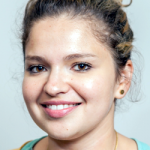
Torrente, Mariana
Associate Professor, Chemistry, Brooklyn College (CUNY)
Academic Appointments:
Associate Professor, Chemistry Department, Brooklyn College, The City University of New York
Faculty, Chemistry, Biology and Biochemistry PhD Programs, The Graduate Center, The City University of New York
Degree(s)
NIH IRACDA Postdoctoral Fellow, University of Pennsylvania School of Medicine, Philadelphia, PA
NIH NRSA Postdoctoral Fellow, Penn State College of Medicine, Hershey, PA
Ph.D. (Chemistry) Princeton University, Princeton, NJ
M.A. (Chemistry), Princeton University, Princeton, NJ
Research Focus:
Our research involves epigenetics, proteomics and protein homeostasis. In particular, we are focused on the role of histone modifications in amyotrophic lateral sclerosis (ALS). ALS is a progressive and fatal neurodegenerative disease. Both familial and sporadic ALS produce similar symptoms; familial ALS represents 5-10% of cases. Familial ALS has been linked to a multitude of genes. How can so many genes produce the same symptomatology? We hypothesize that epigenetic mechanisms—namely histone modifications—play a pivotal role in ALS. Interestingly, a growing body of epidemiologic data suggests that neurodegenerative diseases occur less frequently in cancer survivors, and vice versa. We will study how disruptions in protein homeostasis could lead to cancer processes, and explore the overlapping aspects of neurodegenerative disease and cancer to develop strategies that could prevent both diseases.
Selected Publications
Bennett SA, Cobos SN, Meykler M§ , Fallah M§ , Rana N§ , Chen K and Torrente MP, Characterizing Histone Post-Translational Modification Alterations In Yeast Neurodegenerative Proteinopathy Models. Journal of Visualized Experiments, 2019, Mar 24;(145). DOI: 10.3791/59104 PMID: 30958470.§Undergraduate co-author(s) ^Corresponding author
Bennett SA, Tanaz R, Cobos SN, and Torrente MP, Epigenetics in Amyotrophic Lateral Sclerosis: A Role for Histone Post-Translational Modifications in Neurodegenerative Disease. Translational Research. 2019 Feb; 204:19-30. DOI: 10.1016/j.trsl.2018.10.002. PMID: 30391475 PMCID: PMC6331271 Corresponding author
Cobos SN, Bennett SA and Torrente MP, The Impact of Histone Post-translational Modifications in Neurodegenerative Disease. Biochim Biophys Acta Molecular Basis of Disease. 2018 Oct 20, pii: S0925-4439(18)30396-X. DOI: 10.1016/j.bbadis.2018.10.019. PMID: 30352259 ^Corresponding author
Chen K, Bennett SA, Rana N§, Yosuf H§ , Said M§, Taaseen S§, Meltser SM§, Mendo N§ and Torrente MP, Distinct Histone Post-Translational Modifications Are Connected To Neurodegenerative Disease Proteinopathies. ACS Chemical Neuroscience, 2018, Apr 18;9(4):838-848. PMID: 29243911 PMCID: PMC5906139 DOI: 10.1021/acschemneuro.7b00297. §Undergraduate coauthor(s) ^Corresponding author
Tariq A, Lin J, Noll MM§, Torrente MP, Mack KL, Hernandez Murillo O§, Jackrel ME, Shorter J. Potentiating Hsp104 activity via phosphomimetic mutations in the middle domain. FEMS Yeast Research. 2018 Aug 1;18(5). PMID: 29788207 DOI: 10.1093/femsyr/foy042. §Undergraduate coauthor(s)
Gates SN, Yokom AL, Lin J, Jackrel ME, Rizo AN, Kendsersky NM, Buell CE§, Sweeny EA, Chuang E, Torrente MP, Mack KL, Su M, Shorter J and Southworth DR. Ratchet-like polypeptide translocation mechanism of the Hsp104 disaggregase. Science, 2017 Jul 21;357(6348):273-279. PMID: 28619716 PMCID: PMC5770238 DOI: 10.1126/science.aan1052 §Undergraduate co-author(s)
Torrente MP, Chuang E, Noll MM §, Jackrel ME, Go MS, and Shorter J. Mechanistic Insights Into Hsp104 Potentiation. Journal of Biological Chemistry. 2016 Mar 4;291(10):5101-15 PMID: 26747608 PMCID: PMC4777845 DOI: 10.1074/jbc.M115.707976 §Undergraduate co-author(s)
Grants over the last 5 years
Ongoing Research Support
National Institutes of Health
1K22NS091314 Torrente (PI) 04/01/15- 08/31/20
Epigenetics In Neurodegenerative Disease: Targeting Histone Modifications in ALS
The goal of this project is to study the role of epigenetic mechanisms in the origins of amyotrophic lateral sclerosis (ALS).
Role: PI
The City University of New York
Start Up Funds Torrente (PI) 08/24/15- 08/31/20
Research Foundation of CUNY, The City University of New York
PSC CUNY Traditional B Grant Torrente (PI) 07/01/19- 12/31/20
Discovery Of Molecular Mechanisms For Prion Function In Yeast
The goal of this project is to study the interactomic, transcriptomic, and epigenomic landscape for the Rnq1 prion in the baker’s yeast Saccharomyces cerevisiae.
Role: PI
Research Foundation of CUNY, The City University of New York
ASRC Seed Grant Torrente (PI) 12/01/19- 12/31/20
Prions Meet Phase Separation: Rnq1/[PIN+]
The goal of this project to determine whether the yeast prion protein Rnq1 undergoes phase separation; the sequence determinants for this process; and how it might have a role in normal and aberrant cell biology. Role: PI
Completed Research Support
Research Foundation of CUNY, The City University of New York
PSC CUNY Enhanced Grant Torrente (PI) 07/01/16- 12/31/17
Does Protein Misfolding Cause Depression? Studies on Tryptophan Hydroxylase 2
The specific goals of this proposal include characterizing the in vitro aggregation profile of TPH2 and establishing a yeast system to establish cytotoxicity as a proxy for TPH2 aggregation.
Role: PI
Research Foundation of CUNY, The City University of New York
ASRC Seed Grant Torrente (PI) 04/01/16- 08/31/17
Epigenetics In Neurodegenerative Disease: Targeting Histone Modifications In Parkinson’s Disease
The goal of this project is to study the role of epigenetic mechanisms in the origins of Parkinson’s Disease (PD).
